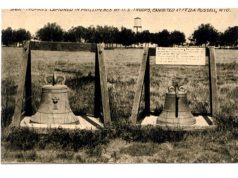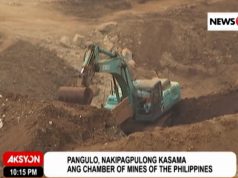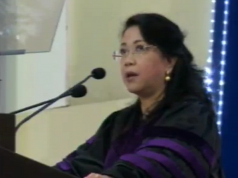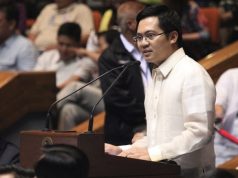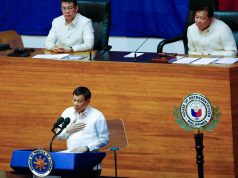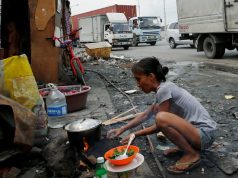MANILA, Philippines – Various groups and sectors geared up early Monday morning for protest-rallies that they will stage near the Batasang Pambansa in Quezon City where President Rodrigo Duterte will deliver his second State of the Nation Address (SONA).
Unlike Duterte’s first SONA that according to the police was the most peaceful in recent history because cause-oriented groups manifested support for his administration, the chief executive’s second address is expected to be met with fierce criticism, frustration, and resistance.
Denunciations and negative reactions are expected to stem from Duterte’s move to prolong martial law in Mindanao and end peace talks with communist rebels, and the worsening human rights violations being linked to his continued war on drugs that has so far resulted in the state-authorized killing of 3,200 drug-linked persons and the number of homicide cases that ballooned to 12,833 deaths, about 16 percent of which were drug-related but not police-sanctioned.
“Ramdam na ramdam…ng mahihirap ang patayan pero ang kanilang kabuhayan ay nananatili sa estado ng paghihintay [Poor people feel the killings but hopes for their livelihoods to improve are hanging],” said Partido ng Manggagawa president Renato Magtubo.
“Ang gyera sa droga at terorismo, ang ekstensyon ng martial law sa Mindanao at posibilidad na palawakin ito sa buong bansa ay lalong magpapamalas ng bagsik ng administrasyon laban sa mga itinuturing niyang kalaban ng estado. Pero ang pagkalulong niya aniya sa adiksyong ito ang siya ring magiging dahilan ng pagkalimot o pagkabigo sa iba pa niyang ipinangakong pagbabago,” added Magtubo.
[The war against drugs and terrorism, the extension of martial law and its possibility to widen its implementation nationwide will all the more show the administration’s ruthlessness against those it considers the enemies of the state. But his [the President’s] addiction to this war will also be the reason why he will forget or fail to fulfill his other promises for change.]
The President’s poverty alleviation strategies are also expected to be weighed, scrutinized, and criticized during his second SONA as the country’s poverty incidence, while decreasing, has remained a double-digit figure and always worst in Mindanao, with at least 20 million Filipinos nationwide — many of them farmers, fishers, and children — not having enough income to meet basic food and non-food needs to survive, based on government data.
“We remind the President that only actions, not empty promises, that push for a bold and decisive policy shift to provide peace, jobs, shelter, and services for the poor, could alleviate the suffering of millions of women and children,” said Gabriela Alliance of Women.
“The promise of a decent and stable job for our workers has remained a castle in the air under Duterte’s administration as there are no concrete steps to end all forms of contractualization,” said the League of Filipino Students.
Unaddressed wide gap between rich, poor
Related to this issue is the unchanged wide gap between the rich and the poor that remains unaddressed even with the continued growth in the country’s gross domestic product (GDP), averaging 6.3 percent from 2010 to 2016.
Only about the 40 richest families in the Philippines account for 76 percent of the country’s GDP. In 2012, the combined P760-billion net worth of the top 10 richest Filipinos based on Forbes’ list was equivalent to the combined annual income of 3.24 million Filipino families in the same year.
“President Duterte’s regime is full of bluster but lacks concrete policies on how to improve the conditions of agricultural workers in the country,” said the Unyon ng mga Manggagawa sa Agrikultura (UMA).
“In fact, his economic and political thrusts are turning right and would only benefit big plantation and hacienda owners. The extension of martial law in Mindanao up to the end of December and the scrapping of the peace talks with the National Democratic Front of the Philippines, on the other hand, would further impinge on the labor and human rights of agricultural workers and the Filipino people in general,” the group added.
According to UMA, sacadas from Mindanao were said to have been recruited by companies owned by the Cojuangcos, Aquinos, and Lorenzos and made to work in slave like conditions in Hacienda Luisita and other parts of Central and even Northern Luzon.
“President Duterte did not even utter a single word to express solidarity with them, but instead frequently visits military camps to condole with soldiers,” it said.
According to the Center for Women’s Resources, nine of 10 farmers in the country remain landless and “peasant women are doubly burdened by poverty brought by landlessness as they are expected to take care of domestic chores as well as participate in farm production.”
“Worse, liberalization of agricultural trade has aggravated the deprived condition of peasant women and their families. With the export-oriented and import-dependent framework of the government, the agricultural products from other countries flood the local market. Filipino farmers could not compete with the imported products since these products are sold cheaper than the locally produced ones. Thus, peasant women and families perennially suffer poverty,” it said.





